- Bernard Preston homepage
- Fast dinners
- Recipes for Mussels
Recipes for mussels
Recipes for mussels bring you the succulent flavour of the sea; how I've missed them since retiring from Holland. The good news is that I will be back in the summer of 2016 to do a locum in Dordrecht.
Well, that was six years ago; you know what I feasted on, and what I miss terribly in sunny South Africa. One can't have everything obviously.
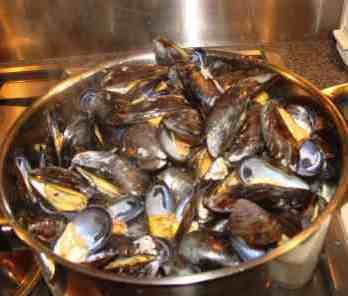
This page was last updated by Bernard Preston on 16th January, 2022.
Recipes for mussels are as Dutch as clogs and dykes. The tides and sand banks of the Waddenzee make perfect breeding-grounds for growing shellfish.
It's become a specialised family business, handed down from father to son for generations, taking at least three-years before they are large enough to be reaped.
- Bernard Preston homepage
- Fast dinners
- Recipes for Mussels
The saltwater mussel, same as whales oddly, feeds in the main on plankton which are tiny sea plants and animals floating in the water.
Most that you will find today in shops are the blue mussel and, though they’re cultivated commercially, they are still fed by the sea.
I spent the summer of 2011 in Holland. Though it was a miserable Dutch weather, Spring was one of the warmest on record with record levels of plankton. The result was three times in nine weeks, recipe steamed mussels was on the menu for me.
Purchasing saltwater mussels
Before buying your mussels have a good look at them. Check the sell-by date. If it is not several days hence, do not purchase them. Are many broken, and are the shells open? Move on, or wait for another occasion. Ask the attendant on which days the fresh ones arrive.
You will pay more for the bigger mussels for their plump and juicy flesh, but the small ones taste just as good. I choose for freshness rather than size.
Why is that? I am very rarely sick, but never will I forget the four-day diarrhoea after eating mussels for the first time, albeit at a restaurant in Brugge.
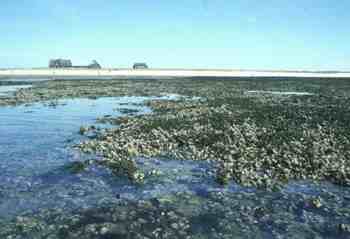
Have you ever been to Belgium? Put Brugge on your must-see list, but avoid the film, I am told; the mussels too. Once a shellfish dies it can make you awfully sick; I know.
So choose mussels that are in the main tightly closed, and always eat them on the same day you buy them.
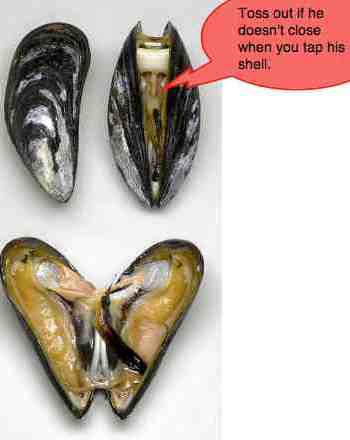
As soon as I get home I start this process of sorting the mussels.
- I throw my saltwater
mussels in a bucket of cold fresh-water, and before long you will notice
them opening and closing. That is a good sign.
- Replace the water several times; in particular it helps to get rid of any grains of sand left in your mussels.
- Get another small basin of water, and carefully go through the mussels, one at a time. It is worth the trouble.
- Prize off any tiny barnacles that have attached to the mussels and pull off any of the tiny beard which is what they use to attach to the rocks.
- Immediately chuck any that have broken shells. They are probably dead, and may be very toxic. Dying meat goes off.
- Place any of the mussels that are wide open in your separate basin of water. Give them a good tap, or flick them with a nail; you will learn the look after doing it once or twice. If they close, drop them back into the sink. If not, leave them in the bowl, and watch them.
- Swish the water around your good mussels in the sink a few times, replacing the water periodically.
- Right, you now have a sink full of your good mussels still in the cold water, and a small bowl that contains hopefully only a handful of your dubious ones.
An apology for the photographs; I will retake them on my next visit to Holland.
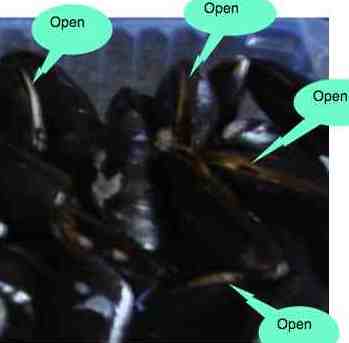
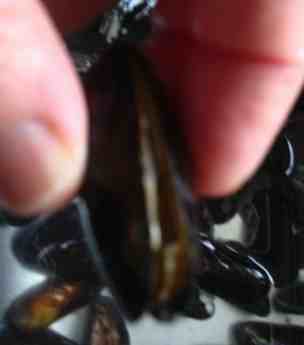
Preparing the mussels recipe
For these delicious recipes for mussels dishes you need some aromatic vegetables. It’s important to add fibre to your meal anyway, and this is the place to do it. I like a leek, some carrots, and good handful of parsley benefits and perhaps a few cloves of garlic; shallots, chives and a stick of celery. Add your favourites. No reason not to add a vegetable like broccoli too.
If you like Oriental food try adding coconut milk, ginger and hot chilli, and other flavours like lemongrass.
- Clean and slice your leek, being sure to get all the mud out of the tops. I like to use the green-leaves too. It’s all nutritious. It is best to slice the top off and then down the middle and wash out any dirt carefully. Shake off the excess water. The hard white stem you can just chop roughly.
- If your cholesterol is in good shape, throw a good dollop of butter in a large heavy-bottomed pot and, when it’s melted, toss in the leeks; otherwise, olive oil.
- Slice your carrots thinly and toss them in with the leeks, stirring regularly. Add no water.
- Add the chopped-parsley, and the other spices and herbs.
Meantime drain your mussels completely; and I mean totally. Tap those in your basin a last few times. Those that are obviously dead, discard. I used to toss the slightly dubious ones too, but I haven’t had a second bad experience, so I usually use them now. That is your call.
It is worth taking the time when it comes to recipes for mussels; I no longer resent the half-hours taken preparing good food; it's well spent and we either spend it or suffer the gross sicknesses of fast TV dinners.
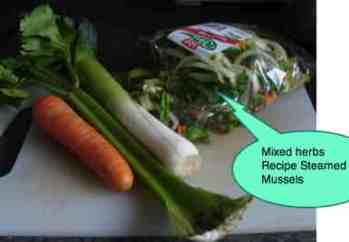
Cooking your mussels

I enjoy cooking with wine; sometimes I even put it in the food I'm preparing!
Julia Childs
- Do not add any water to your vegetable mix. The mussels still have plenty of liquid in them.
- Turn up the heat, and scoop your mussels on top of the vegetables for this scrumptious steamed recipe.
- Slosh
some white-wine over the mussels, and put on the lid to steam them. Now
you have delicious mussels in murky sauce.
- Frequently, using a large spoon, dig down to the bottom and scoop the veggies and white wine to the top, so their flavours can dribble down through the mussels.
- Mussels need very little cooking. As soon as the shells start to open, you know they are ready to be eaten. Do not overcook them or you will end up with rubbery flesh. Discard any that fail to open fully, and do not worry about the colour. The females have orange meat, and the male's flesh is whiter.
Recipes for Mussels
Recipes for mussels can be cooked in a jiffy but preparing them takes a few minutes.
The succulent flavour of the sea
How to cook mussels is really dead easy, right? Make haste; take your steaming mussels directly to the table, and scoop them into large bowls together with the veggies, on a bed of wild brown-rice; the juicy bouillon too, with a dab of butter on the whole grain if your cholesterol is in order.
Most of the world would disagree, but I would never eat refined white rice. It has a glycemic-index higher than that of sugar and is devoid of nutrients; empty calories.
Mussel and chickpea soup
This year I must have been a little generous with the white wine,
because at the end of one meal, I had half a pint of mussel bouillon
left over. Mm, what to do with it?
- Half a pint of bouillon, left from your recipes for mussels.
- One onion
- 2 cups of soaked and cooked chickpeas
- One very ripe tomato
- One slither of chili
- Half a dozen mussels if there were any left after dinner.
Newsletter
Our newsletter is entitled "create a cyan zone" at your home, preserving both yourself and Mother Earth for future generations; and the family too, of course. We promise not to spam you with daily emails promoting various products. You may get an occasional nudge to buy one of my books.
Here are the back issues.
- Lifestyle and ideal body weight
- What are ultra-processed foods?
- Investing in long-term health
- Diseases from plastic exposure
- Intensive lifestyle management for obesity has limited value
- A world largely devoid of Parkinson's Disease
- The impact of friendly bacteria in the tum on the prevention of cancer
- There's a hole in the bucket
- Everyone is talking about weight loss drugs
- Pull the sweet tooth
- If you suffer from heartburn plant a susu
- Refined maize meal and stunting
- Should agriculture and industry get priority for water and electricity?
- Nature is calling
- Mill your own flour
- Bake your own sourdough bread
- Microplastics from our water
- Alternative types of water storage
- Wear your clothes out
- Comfort foods
- Create a bee-friendly environment
- Go to bed slightly hungry
- Keep bees
- Blue zone folk are religious
- Reduce plastic waste
- Family is important
- What can go in compost?
- Grow broad beans for longevity
- Harvest and store sunshine
- Blue zone exercise
- Harvest and store your rainwater
- Create a cyan zone at your home
Here is a tip; because I make our authentic hummus recipe at least twice a week, it takes only four-minutes, after all, I keep a large stock of cooked chickpeas in the freezer.
So, here is another of our recipes for mussels. Fry the onion in a little butter, add the tomato and the chili and the stock, the chickpeas, and simmer for ten minutes. Sprinkle with a little parsley, and if you want to be disgusting, add a teaspoon of whipped cream to each bowl; if your cholesterol is in order, which it must be if you follow the recipes at my sites.
It's just another of our saltwater mussels recipes; it is stunningly good.
Chickpeas incidentally are second only to Quaker oats recipes in lowering cholesterol. We eat them almost every day, and an apple; and then you can almost certainly dump the rest of your cholesterol medication, with their nasty side effects.
Mussel Facts
Shellfish get a lot of bad press, but what are the facts? Are they high in cholesterol or MUSSEL FACTS.
Vitamin B12 & saltwater mussels
As you probably know there has been an explosion of autoimmune diseases in the last century; diabetes, MS and pernicious anaemia. And a host of very rare conditions that are no longer so unusual. No one is really sure of the reason but it certainly has something to do with our Western lifestyle, and probably the food we eat.
One of them attacks the lining of the stomach that produces a very special substance called Intrinsic Factor; without it you would die.
Whether it's the preservatives or food additives, antacids or a host of other drugs, the parietal cells that produce intrinsic factor in our stomach are dying; that means we cannot absorbe enough vitamin B12. Many of us are marginally deficient, and some have a serious problem. Perhaps it is cellphone radiation, solar storms or stress. Everyone has his own conspiracy theory.
There are two solutions.
Eat as much B12 rich foods as we can on a regular basis; that means using recipes for mussels frequently, and several eggs a week.
Eggs are back, by the way. The American Heart Association no longer forbids them in the diet. In fact, bizarre as it seems, along with butter, they are being recommended again. There is a lot of fashion in food too, some so bad that we have to change it every year; like margarine.
Vitamin D
Vitamin D is now being shown to be vital for a host of processes in the body from preventing heart disease, diabetes, hip pain and osteoporosis. We just do not get enough, especially if we live far from the Equator.
Delving regularly into recipes for mussels, and a daily walk in the sun, with a hat on, is part of the solution.
If you are interested, here is more on food rich in vitamin D.
USEFUL LINKS
Omega 3
Getting enough of the right fats in our diet has become absolutely vital in our increasingly diseased Western society. A huge part of that pain and disability is due to osteoarthritis; it's a complex subject, but an important part of the problem is our inflammatory diets; too much omega 6 and far too little omega-3.
That causes not only pain and disability in our muscles and joints, but also in our blood vessels and organs.
Painful back and hips? More exercise, less sitting, a chiropractic adjustment if there are fixations, but more omega-3 too.
Don't take pills; the research shows that omega 3 is more effective from eating foods rich in these vital fatty acids. Recipes for mussels and fatty fish like salmon, and freshly ground flaxseed is the solution to inflammation.
Worried about your weight? Cutting out all the fat in your diet is definitely the wrong way to shed those pounds. Apart from the fact you'll be constantly hungry, 60% of your brain is fat, and your nerves are coated in a vital fatty sheath.
Cutting out the high glycemic index carbohydrate, not the good fat, is the right way to lose weight.
A vitamin D deficiency is a common cause of frailty syndrome; it is involved in so many processes in the human body.
Did you find this page interesting? How about forwarding it to a friendly book or food junkie? Better still, a social media tick would help.
- Bernard Preston homepage
- Fast dinners
- Recipes for Mussels
Address:
56 Groenekloof Rd,
Hilton, KZN
South Africa
Website:
https://www.bernard-preston.com